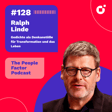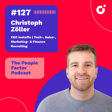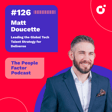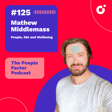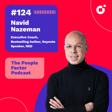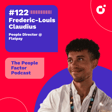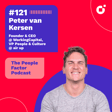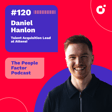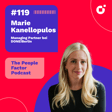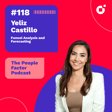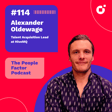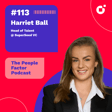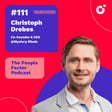Introduction and Guest Biography
00:00:00
Speaker
Today's guest, Guillermo Miranda.
00:00:07
Speaker
Exactly, and I think if this is solved, really helpful, but um let's let's say salary data, right? HR has access to salary data. If companies also um do performance ratings, HR has access to performance. um Now when technology comes in and technology is accessing the income data and the performance data of of people and individuals, it should be safe and secure. And
AI's Role in HR and Data Security
00:00:35
Speaker
I think it also needs to be very carefully trained, um because I think this has really big, big, big impact on ah on a person's life.
00:00:45
Speaker
But if the technology is just playing around and making decisions on that, um this can be dangerous, right? So um how how do you think about the sensitivity of data and what do you think needs to be accomplished there and where should it maybe stop? And where do you need to be very careful about certain things you do with it? Yes. So again, we call it co-pilot because it's an extension to get things better. We don't call it pilot.
00:01:14
Speaker
with The pilot is the human being that is making the decision. This is additional insights to have more context to do better decisions. And the whole topic of data and the sensitivity and the process of security is something that needs to be embedded in how you are designing the future. And yes,
00:01:38
Speaker
like in HR, there is performance, there is salary data that needs to be treated carefully. There is personal data in a health environment about people. There is tax data with the tax agencies. There is a lot of sensitivity about data and those protocols are important to be as part of a framework of AI governance that companies should have clarity. We, as an AI company, generative AI platform, we have good protocols. We already have a framework of how to manage ah security, how to manage AI, what is the purpose of AI. That simple clarity is important. The purpose of generative AI in the platform of
00:02:30
Speaker
Atlas Copilot is to enhance the powers of human beings. It's not to replace human beings, it's to enhance the power. And that guidance already helps you to package everything else. In Data,
00:02:45
Speaker
the data belongs to the client. And that's a principle. From that, everything starts. We are not using data to train agents. We are not using data to do things without full anno mean anonymization. And so if you have clarity in the framework, then you can execute.
00:03:04
Speaker
And here is where it is important how the characters that are creating the future have this clarity of values and clarity of purpose. And each company should have, like we have clarity on why you are using generative AI, how you are managing the data and the risk. You go to our website and you will find those Q and&As there very clearly and guiding our day-to-day When we onboard a new employee, this is part of our process. When we discuss with clients, we discuss how to do it. yeah we A very
Guillermo's Career Journey and Startup Vision
00:03:43
Speaker
clear example, we have a client that came to us and said, hey, I want to eliminate all my HR partners. Help me to do it.
00:03:50
Speaker
And we very kindly said, look, our platform is not a platform to replace. It's a platform to be a compiler. Let me explain to you. If what you want is to eliminate roles, plainly and upfront, then you will need to do something else. We are not here to help that for you.
00:04:13
Speaker
We talked about um AI and his perspective on the future, on the past, and what he's currently building with um um Atlas Copilot. And he saw big, large enterprise global companies and more than 30 years in HR and has a lot of curiosity and hunger still to just build something new and is now doing a startup. So really interesting insights, perspectives, and tune in.
00:04:43
Speaker
Then you can build trust and then you can spend less time communicating and more time just getting shit done. Then I went home and and thought about this sentence. We basically put it on the table. Hiring takes time. People are trained. How to objectively judge certain situations. It's very, very, very, very hard to change things. That was the learning. Entrepreneurs with empathy. To the people's side. Hi, Guilhermo. Looking forward to this conversation about AI, but first talk us through what you um did in the past and why you founded Atlas Computers.
00:05:14
Speaker
Absolutely. Good morning, good morning, good afternoon, wherever you are in the world. ah So let me start with a confession. I am a lawyer. um I started my professional life as a lawyer. Then I did an MBA and then I have a corporate career, a very typical corporate a career with IBM.
00:05:37
Speaker
And then with Boeing, um I was a CHRO in the digital space. I was a chief learning officer. I was a chief talent officer. And then I decided that I want to be on the other side of the equation, on the side of the equation that you create the innovation.
00:05:56
Speaker
And this is how in the summer of 22, we did a change and I became more of an advisor of unicorns and a co-founder very recently. And the fascination is with the product and how a product A technology can help you to change your life, can help you to accomplish things that you were not able to accomplish before. And that's what we are trying to do here with Atlas Copilot, is to put the power of generative AI in the hands of HR professionals to elevate their access to business acumen, to ideas, to insights,
00:06:40
Speaker
that you don't need to pay somebody else to get you that. You don't need to ah spend hours researching in internet. It's everything in front of you. And and that's what yeah are comedic we we are How can we ah and imagine that in a practical example, what would be a typical use case?
00:07:02
Speaker
Oh, absolutely. Look, and the typical use case is the tool that I always wanted as an HR professional. So I have to do a presentation to the management board in the next week, and I have to present our plans to career acceleration for top talent.
00:07:24
Speaker
And we have a program, an initiative that we want to too sharp, but we also have to present to the management board. some of the market situation to position why you are doing it this way instead of that other way, et cetera. So I will use Atlas to give me context on the market to research from experts that already did it, other practitioners. So it's not a theoretical idea, it's other
00:07:58
Speaker
THROs that already did it. And then I will use also Atlas to help me to refine the, usually when you go to a presentation, or you have an executive aspect and then Atlas will help you to prepare the the executive aspect. And I would feel much more prepared, yes. Yes, I think that's a smart way to to support and enable because I think there are several principles out there, but are really powerful. For instance, structuring information in a certain way that is really simple to understand. And if you have a certain pool of information or data um and you have different stakeholders, you need to display and frame the information in a different way that it's relevant for them and it's in their language. Right. And I think if ah
00:08:44
Speaker
technology is trained in that way, it can get super um excellent in it and also maybe fast in just preparing a draft. And then maybe a human even needs to adapt and modify it, right? That you also have the personal touch and that everybody, that everything is is really fine-tuned. But what I saw is that a lot of, first of all, HR professionals, for instance, they're not able to structure thoughts in a way that the stakeholder or a senior manager or an executive understands it from their perspective. That's,
Practical Applications of AI in HR
00:09:21
Speaker
I think what I saw often now 90% are not able to do that, yeah or not even aware of the impact of doing it. And then that's the problem that you never have the chance to influence.
00:09:33
Speaker
And I think that's so important to train this skill. And the second is when you are able to have this skill, the question is how do you gather the right information that people believe you, what you try to push in terms of a business case, for instance, right? Because I think it's also about timing and it's about receiving the message at the right time with the right context, right? And therefore I would be super interesting to understand how do you make sure um to get the right data and where do you get the data from?
00:10:10
Speaker
Yes, so look, ah you are absolutely right on how to position the ideas and how to present it to have a proper business conversation. And this is part of the challenge that we are trying to help and support ah from Atlas. The first thing is because the content of Atlas is made of all the materials, webcasts, podcasts, part of the content,
00:10:37
Speaker
comes from HR leaders, which is one of the founders of Atlas. You will have real life examples of other experts in HR, other CHROs, chief talent officer, chief learning officer, that are explaining their own ideas. So you will have firsthand insights on how to present and how to explain. And then We also have experts in the platform, like Dave Ulrich, like Chester Elton, like Marshall Goldsmith, that have mastered the art of presenting and putting in context an idea. And you will have that already curated for you. And then several open source resources that provide market insights.
00:11:25
Speaker
So we have a process of curation of the data that then is part of the enrichment of the LLM and how the users can access things first that are not in the internet. These are things that are already curated for them. Second, you feel at home.
00:11:46
Speaker
because this is a platform that is made by a chart professional four HR HR professionals with fantastic product like Chat GPT. It's just the open world. Chat GPT is made for everybody. So is yeah, it's good. It helps me. I use it as well. But it does not give me this feeling that I am at home with other HR professionals. And that's very important. It's part of the user experience. And more important, it's part of how the content is tailored to the task. So it's not a lot of generic content that can sound smart. It's very well curated content that can help you to prepare and to be ready to execute in the context of the people equation in a business environment.
00:12:37
Speaker
in case you like my show please subscribe i would really appreciate it I also see um a video on your website that there is a live call of people from different companies and also a live summary. And I find this really interesting and because I was just at a sales executive um event in Dina where there was said that It would be interesting to have a product that sits live with you in the call and knows the product really well when doing a sales call or a qualification call. And then, for instance, when you need certain information about the at the product, let's say you you're selling a technical product, right which is a bit complex and has different variations. And then your customer has or potential customer has specific questions and you are
00:13:23
Speaker
Just the person that really gets the deal has the relationship but not maybe the in detail product knowledge you would have maybe a copilot that really knows the product inside out and Then you just ask life in the call. Hey, what is the pricing under that circumstances? What would be different options and then the technology is calculating that instead of for instance ah sales engineer, for instance, right? So this was a use case where they said this would be helpful, and this would be interesting to have. And I see that you two are doing already something in that direction. um So what what do you think this your product can be used for in life course, because the summaries look really nice.
00:14:07
Speaker
Yes. So look, the idea is that you get these extended powers that by technology in the flow of work, the way that you you are doing your day to day. So in the very specific case case that you mentioned, part of the value proposition of Atlas Copilot is to have ah participate in all these webcasts and podcasts that we do with HR leaders. And there is going to be a streaming with a Gen AI agent in the streaming. So it can help you to summarize, it can help you to give you hints of what is going on in the call as well.
00:14:47
Speaker
But as important as that, the agent can surface in the environment of teams, in the environment of a Slack. So if you are having a conversation with a business leader, you are an HR person, having a conversation with a business leader, talking about an initiative in teams on Slack, you can call Atlas.
00:15:11
Speaker
Atlas will read all the previous conversation and start giving you insights and says, yes, based on this discussion that you have, let me show you some examples that in your industry make sense and the other companies did. Or these are the two ideas that you need to Decide or confront or this is a best better example for this because it will be able to understand context and that is very important in in technology because it's not just the assistant that is spells back
00:15:47
Speaker
of an answer. This is an agent that is able to understand context. And that's ah one of the forward technology will continue to evolve. But this is always important to be at the leading age, experimenting there. And this is what we are doing with Atlas. And now I think I'm really interested in in the personal story behind that because you were in HR.
00:16:12
Speaker
in big corporates and advising roles, but you just saw a lot over the past years, right? And what what was the trigger of going down that route and now founding your own company for that?
00:16:31
Speaker
The trigger was curiosity and the trigger was the aim to share with more people what you can help to accomplish. So curiosity in order to explore the limits of how you can reinvent the ways that you do.
00:16:49
Speaker
The people talks about the future of work, like i ideal, a concept. So the future of work is here. The future of work is already happening. And the way that you can use technology to accelerate your output, to improve your productivity, is something that I've been always interested. interested I have the privilege to work for many years with a large company like IBM, where technology is the day to day. IBM
00:17:21
Speaker
put technology to solve business problems. And that's what I learned. And I have the privilege also to interact with several clients that gave me different point of views, et cetera. And then I work with a big aerospace company where you have also the privilege to be in the date-to-date and to see how technologies reinventing a very large manufacturing environment, engineering, manufacturing environment. So, from those learnings is where I took the the curiosity and the interest to share.
00:17:55
Speaker
and The opportunity to be at the edge of how we are reinventing things is something that is priceless. And that's what drives my energy and my effort to say, hey, let me show you how this can be done. Hey, let me share how this technology can help you in your day to day. Hey, let's collaborate and work differently to reinvent the future. And
AI in Business Operations and Contextual Use
00:18:22
Speaker
that's the the big motivation behind, if you want.
00:18:26
Speaker
and When you look at it long term, how many jobs will be created? How many jobs will be changed? And how many jobs will be eliminated? Do you have an idea about or um an opinion about that? Yeah, there are very good studies that have been done with good basis. So there is an study by the World Economic Forum. There is an study by McKinsey. There is an study by Deloitte. And the numbers are in the millions. And the numbers are in the millions both for reinvention, for new jobs, and for jobs that are no longer going to be necessary in that context. But like any change
00:19:13
Speaker
that have been in history driving the way that we interact as a society, there is going to be transformation and there is going to be transition. I think that what we need to understand is that every single person will need to learn how to interact more deeply with technology.
00:19:33
Speaker
And that's on one side and a skill. And we have all learned how to use Excel, how to use chats, how to use all these things we are learning. So AI is going to be an acceleration of those components. And it's not just for the professional worker. It's also for the frontline worker because all these things are coming in our mobiles.
00:19:58
Speaker
are coming to our life in ah in a day-to-day, are coming to the schools, are coming to universities. ah ah One of the more legacy, archaic institutions are universities. Universities are going to be deeply transformed because this is not about transferring knowledge, this is about teaching how to use ah opportunities. And I think that's an important component. so Both online, we all need to learn how to work with technology. We all need to be
00:20:34
Speaker
open to what is the change that is coming. There is a very good study that I would love to share with everybody that attends the podcast from the Stanford University Media Lab and basically says the mindset is one of the most important things to embrace technology. You can be either a pilot or a passenger. If you choose to be a pilot, you will have control of how you are recreating the future.
00:21:03
Speaker
If you choose to be a passenger, you are going to be a passive victim of what the driver is doing in your life, right? And that's very important in terms of mindset. Mindset makes the difference, and that's the way that we should ah face this transformation and this change in our society. For good, or this will create a lot of opportunities, but we need to be open-minded to embrace those opportunities.
00:21:31
Speaker
In case you have any feedback or anything you want to share with me, please send me an email on thomas at peoplewise.com or hit me up on LinkedIn. And in case you really enjoyed the show, please subscribe. I would really appreciate it. Yes. and And I see now, I totally agree with you. And I see now that a lot of um companies are playing with it, they are testing, but they're not implementing. Um, and I think this is also still down to it's quite complex still to use it in the right way, because I think just doing a prompt, um, that gives you something valuable is not so easy, right? You need to really play around and you really need to understand how to prompt. So prompting itself, I guess something is that is a skill.
00:22:24
Speaker
And you can develop them, of course, but I think once maybe the technology is that holistic that you don't need to type something in somewhere. And it's more obvious around the context that The technology understands you're currently, for instance, in the car. Then you maybe should not prompt, right? But maybe you should just talk and the context that you're in the car should already be there. And the context of why you are in the car should also be there.
00:22:56
Speaker
so You don't need to give all this information. Hey, I'm in the car and I'm now going from, I don't know, Berlin to Munich. And this is what I want to do. And I have an appointment there. And um now please help me figure out my schedule because there's traffic jam or so on, right? It should be all there already. And I think once we are at that stage, it's good it's getting really powerful and really disruptive.
00:23:21
Speaker
Yes, the context is everything for questions. Context is everything for what you want to accomplish. i said As a lawyer, I can tell you from my experience that when you are working in cases, when you are working ah in contracts, context is extremely important to get the outcome that you are looking for.
00:23:44
Speaker
And technology can help us in different aspects of our life. The example that you describe is a daily life example. And consumer brands like Apple, and I am sure Samsung will come very rapidly with artificial intelligence integration in your phone.
00:24:03
Speaker
in your smartphone that is going to be part of this context and we'll understand. Oh, I know because of your agenda where you are. I know because of the GPS that you're already halfway. I know because of your meetings they schedule that you need to arrive in less than 30 minutes. I know that the road is crowded here. So I start to reroute. I start to send an email and say, hey, I running five minutes late. All these things that can create a hassle for us to today because I am driving, I'm trying to send an email that I have to drive, can be done and can be extensions of our daily life. The same way in a professional environment.
00:24:48
Speaker
You can have a lot of help from technology. If you are a frontline worker and you are in a construction site, there is a lot of stimulation, there is a lot of risk management that needs to happen, and it can be provided with technology. Same in an office. There is a lot of context where you are preparing an output. And the interaction, not necessarily the prompt, not necessarily needs to be done in a so complex way because that your base technology will already understand the context. So yes, this this is this is part of the future that we are all shaping together. And with Atlas, we what we want is to have that
00:25:35
Speaker
future shape well tailored for HR professionals, made by HR professionals, and be able to elevate the profession. In many contexts, HR is understood as administrative. You are the police to make the guidelines, and you are not the business person that helps to impact positive the clients. If you have the insights to do it, that will be better, faster, and more accurate. And that's the
Security and Governance in AI
00:26:07
Speaker
extension of power that we want to give to HR professionals. Exactly. And I think if this is solved, really helpful. But um let's let's say salary data, right? HR has access to salary data. If companies also do performance ratings, HR has access to performance.
00:26:25
Speaker
um Now, when technology comes in and technology is accessing the income data and the performance data of of people and individuals, it should be safe and secure. And I think it also needs to be very carefully trained um because I think this has really big, big, big impact on ah on a person's life.
00:26:48
Speaker
But if the technology is just playing around and making decisions on that, um this can be dangerous, right? So um how how do you think about the sensitivity of data and what do you think needs to be accomplished there? And where should it maybe stop? And where do you need to be very careful about certain things you do with it? Yes. So again, we call it co-pilot because it's an extension to get things better. We don't call it pilot.
00:27:17
Speaker
with The pilot is the human being that is making the decision. This is additional insights to have more context to do better decisions. And the whole topic of data and the sensitivity and the process of security is something that needs to be embedded in how you are designing the future. And yes,
00:27:41
Speaker
like in HR, there is performance, there is salary data that needs to be treated carefully, there is personal data in a health environment about people. There is tax data with the tax agencies. There is a lot of sensitivity about data and those protocols are important to be as part of a framework of AI governance that companies should have clarity. We, as an AI company, generative AI platform, we have good protocols. We already have a framework of how to manage ah security, how to manage AI, what is the purpose of AI. That simple clarity is important. The purpose of generative AI in the platform of
00:28:33
Speaker
Atlas Copilot is to enhance the powers of human beings. It's not to replace human beings, it's to enhance the power. And that guidance already helps you to package everything else.
00:28:46
Speaker
in data the data belongs to the client. And that's a principle. From that, everything starts. We are not using data to train agents. We are not using data to do things without full an um mean anonymization. And so if you have clarity in the framework, then you can execute. And here is where It is important how the characters that are creating the future have this clarity of values and clarity of purpose. And each company should have, like we have clarity on why you are using generative AI, how you are managing the data and the risk. You go to our website and you will find those Q&As there very clearly and guiding our day to day.
00:29:36
Speaker
When we onboard a new employee, this is part of
Future Predictions for AI's Impact
00:29:39
Speaker
our process. When we discuss with clients, we discuss how to do it. yeah we A very clear example, we have a client that came to us and say, hey, I want to eliminate all my HR partners. Help me to do it.
00:29:53
Speaker
And we very kindly said, look, our platform is not a platform to replace. It's a platform to be a compiler. Let me explain to you. If what you want is to eliminate roles plainly and upfront, then you will need to do something else. We are not here to help that purpose. I totally understand. What do you wish for the future when you look into AI? Do you have maybe a prediction?
00:30:21
Speaker
yeah Yeah, the prediction is that we need to be eyes wide open into the future. I think that this important attitude and mindset.
00:30:33
Speaker
what i see is a way that can be complicated and convoluted if we are just acting by instinct and by reaction, and a way that can be much better organized with a better impact on society. Here I am not talking just about business output of more profit for companies. I am talking about the positive impact on society. And that requires a very intentional purpose and a very intentional way to operate. That's what I see as the future. I trust human curiosity. I trust human ingenuity. This is why we are playing at the leading edge of technology because we have an intention and we have very clear values.
00:31:21
Speaker
Thanks. Thank you so much for participating. I really enjoyed it. And um have a nice weekend. Same for you. Great weekend. And in the US, it's 4th of July weekend next week. So happy holidays for the US-based people.



